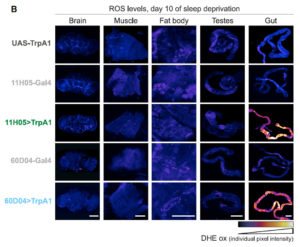Sleep is important, at least this is what my parents still tell me all the time, given that too often I tend to ignore this fact. But in the study, the researchers wanted to know why sleep is important. They mainly used fruit flies, for which good genetic models for sleep loss exist. Thus, the researchers used an inducible method to active neurons in the brain that suppress sleep. In an alternative approach, they also introduced loss-of-function mutations or knocked down the expression of known sleep regulatory genes. The sleep deprived flies started to die after a week of sleep loss.
The researchers then tried to identify cellular markers of damage that appeared during the sleep deprivation. And the major marker they identified was an increase in Reactive Oxygen Species (ROS). What was amazing was that the induction of ROS was dramatic and happened specifically only in the gut, but no other tissues (see figure). The increase in ROS in the gut was accompanied by increases of stress markers in the gut, such as increases in DNA damage and cell death (apoptosis and necrosis). Importantly, this amazing finding was reproduced in sleep deprived mice.

The figure shows the levels of Reactive Oxygen Species (ROS) in different fly tissues. ROS were measured using a fluorescent dye (DHE=Dihydroethidium) that shows red fluorescence when reacting with ROS. The flies in row 3 and 5 are genetically modified to induce sleeplessness.
But that was not all. Even more amazingly, the scientists were able to prevent death of sleep deprived flies by giving oral antioxidant compounds or by expressing antioxidant enzymes (superoxide dismutatase and catalase) in the gut. These interventions allowed the flies to live despite not sleeping.
This study naturally raises a number of interesting questions:
How does sleep deprivation lead to ROS accumulation?
Why does the ROS production specifically take place in the gut?
How do ROS in the gut cause death?
And what does this study tell us about the normal function of sleep?
The study does not really have clear answers to these questions. One obvious hypothesis for the increase in ROS in the gut is that we tend to eat more if we don’t sleep, which would lead to greater gut activity. However, the researchers were able to rule out that the ROS increase is due to overeating. Alternatively, the researchers suggest that ROS clearance in the gut may be a normal daily function of sleep.
One interesting possibility is that the ROS production is related to increased gut motility. Normally, sleep causes profoundly decreased gastrointestinal motility (
reference). Hence, sleep-deprived organisms would have high gut motility, which would be accompanied by an increase in energy production and possibly increased production of ROS.
Generally it is of course believed that the main function of sleep is for regeneration of our body, in particular the brain, as well as functions such as processing of information and consolidation of our memory. Does this study suggest that these other functions of sleep are not important and that the main function of sleep is to prevent ROS accumulation in the gut. Not necessarily. The fact that sleepless organisms who express antioxidant enzymes in their gut survive does not mean that they are perfectly fine. In real live, these flies probably have a selective disadvantage. Like most others, when I don’t sleep for one night, I am still somewhat functional, but I cannot really concentrate and tend to doze off when at rest. In a real world, this would probably put me at a great disadvantage to fall prey to predators.
As an interesting side note, one thing I have observed is that lack of sleep seems to make me more disinhibited and I have in fact given some of my best presentations after only sleeping for a couple of hours…
Anyway, what this study shows is that often we don’t know the answers to some common phenomena that we experience daily.

